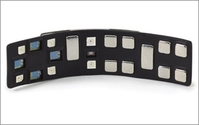 With
rumors swirling of an inevitable Apple iWatch and health monitoring being baked into the next version of iOS, Samsung appeared to preempt its sworn rival with announcements this week around an open
platform approach to sensor-based mobile health monitoring.
With
rumors swirling of an inevitable Apple iWatch and health monitoring being baked into the next version of iOS, Samsung appeared to preempt its sworn rival with announcements this week around an open
platform approach to sensor-based mobile health monitoring.
The Samsung Digital Health Initiative introduced an open platform wristband reference design (the “simband”)
yesterday that can track everything from heart rate to breathing and blood pressure. Using an open software architecture, the reference design can be used to aggregate data from a range of inputs to
show on the wristband.
The initiative is being pitched to consumers as a way to control their health. At the same time, the efforts are aimed at developers to encourage both hardware and
software development from the reference design. As part of the rollout, Samsung announced a $50 million investment fund for start-ups in the digital health space.
advertisement
advertisement
The hardware platform for the
Simband allows third parties to develop new sensors and algorithms for health monitoring, including new form factors, battery design and non-invasive sensors. The software platform is cloud-based and
designed for secure storage of health data that can be accessed by hardware and software.
Samsung hopes that developing an open architecture will invite entrepreneurial innovations and
unanticipated new extensions of the basic technology. Samsung had already announced an agreement with the University of California at San Francisco to have their experts help validate new technologies
developed for the platforms.
Samsung has already entered the wearable and fitness device space with their Galaxy Gear series of devices that have met with mixed reviews. But the overall
popularity of the fitness device space is undeniable. In 2013 alone, NPD sized the U.S. market in fitness devices at $330 million, with Fitbit, Nike and Jawbone dominating the category.
Apple’s entry into the wearable device market appears inevitable, and leaks and rumors point to health information becoming centralized in iOS 8, which many believe Apple will preview next
week at WWDC. Most observers expect an iWatch with health-monitoring capabilities to launch later this year.
By emphasizing an open architecture approach to the health space, Samsung
appears to be preempting Apple with an alternative approach much like Google’s Android counterpoint to iOS. Apple is notoriously proprietary and controlling of its mobile OS.